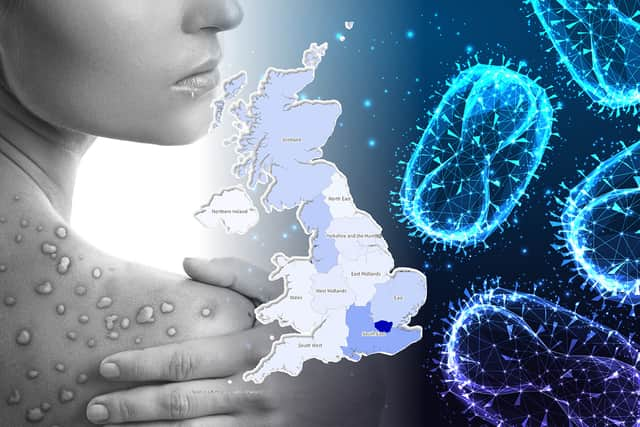World Health Organisation declares monkeypox a ‘global emergency’
and live on Freeview channel 276
The World Health Organisation (WHO) has declared the monkeypox outbreak - with the UK’s epicentre in London - a “global emergency”.
Cases of the virus have been found in more than 70 countries and WHO describes it as an “extraordinary” situation.
Advertisement
Hide AdAdvertisement
Hide AdAccording to the UK Health Security Agency (UKHSA), between May 6 and July 11 this year, there have been 1,735 confirmed monkeypox cases in the UK – 1,229 were Londoners.
Earlier this month mayor of London Sadiq Khan said: “London is currently seeing the highest rate of infection and I’m deeply concerned that reported monkeypox cases have doubled in less than a week.
“If we have learned anything from the COVID-19 pandemic, it’s that early action and coordination is vital to get ahead of the curve.
“The government must rapidly ensure that there’s a coordinated and resourced approach to tackle the threat faced by monkeypox now.”
Advertisement
Hide AdAdvertisement
Hide AdMonkeypox cases have been confirmed in the United Kingdom and the United States.
Here is all you need to know:


What is a ‘global emergency’?
Although monkeypox has been established in parts of central and west Africa for decades, it was not known to spark large outbreaks beyond the continent or to spread widely among people until May, when authorities detected dozens of epidemics in Europe, North America and elsewhere.
Declaring a global emergency means the monkeypox outbreak is an “extraordinary event” that could spill over into more countries and requires a coordinated global response.
The emergency declaration mostly serves as a plea to draw more global resources and attention to an outbreak.
Advertisement
Hide AdAdvertisement
Hide AdThe UN health agency’s declaration could spur further investment in treating the once-rare disease – and also worsen the scramble for scarce vaccines.
Have the WHO declared a ‘global emergency’ before?
The WHO previously declared emergencies for public health crises such as the Covid-19 pandemic, the 2014 West African Ebola outbreak, the Zika virus in Latin America in 2016 and the ongoing effort to eradicate polio.


How many cases have been confirmed in the UK?
UKHSA has published the latest epidemiological overview for the ongoing monkeypox outbreak.
It shows that as of 21 July, there were 2,208 confirmed cases in the UK.
Of these, 2,115 are in England.
Advertisement
Hide AdAdvertisement
Hide AdDr Meera Chand, Director of Clinical and Emerging Infections at UKHSA, said: “While anyone can catch monkeypox, the majority of monkeypox cases in the UK continue to be in gay, bisexual and other men who have sex with men (MSM), with the infection being passed on mainly through close contact between people in interconnected sexual networks.
“Before you go to a party or event, check yourself for monkeypox symptoms, including rashes and blisters.
“If you have monkeypox symptoms, take a break from attending events or sex until you’ve called 111 or a sexual health service and been assessed by a clinician.
“It can take up to 3 weeks for symptoms to appear after being in contact with someone with monkeypox, so stay alert for symptoms after you have skin to skin or sexual contact with someone new.”
What are the symptoms of monkeypox?
Advertisement
Hide AdAdvertisement
Hide AdAccording to the NHS’s website, the symptoms of monkeypox are:
- a high temperature
- a headache
- muscle aches
- backache
- swollen glands
- shivering (chills)
- exhaustion
A rash usually appears 1 to 5 days after the first symptoms. The rash often begins on the face, then spreads to other parts of the body. This can include the genitals and anus.
It starts as raised spots, which turn into small blisters filled with fluid. These blisters eventually form scabs which later fall off.
The symptoms usually clear up in a few weeks. While you have symptoms, you can pass monkeypox on to other people.
What should you do if you come into contact with monkeypox?
Advertisement
Hide AdAdvertisement
Hide AdUKHSA guidance for close contacts of a confirmed monkeypox case has been updated. This means close contacts won’t need to isolate at home if they don’t have symptoms.
The change is being implemented in response to latest data showing that a relatively small number of close contacts have gone on to develop monkeypox and a lack of evidence of transmission outside of close intimate or sexual contact, now that more epidemiological information is available. It means the latest guidance is proportionate to the latest transmission risks identified and is in line with advice from the WHO, other European countries and the CDC.
For category 2 and category 3 close contacts it is recomended people should:
- contact NHS 111 or a sexual health clinic if they develop a fever or any of the other symptoms described below
- avoid skin to skin contact with others, such as hugging and kissing
- refrain from sexual or intimate contact
- avoid international travel if possible; travel insurance may also not be valid for people advised not to travel
- let health or dental facility staff know they’re a close contact before attending for health or dental care
For category 3 close contacts:
- we recommend avoiding close contact with children aged under 5 years, pregnant women and those who have an impaired immune system
- if they work with children aged under 5 years, pregnant women or those who have an impaired immune system, UKHSA or their employer might inform them if they need to take time off – this decision will be based on a personalised clinical assessment
Comment Guidelines
National World encourages reader discussion on our stories. User feedback, insights and back-and-forth exchanges add a rich layer of context to reporting. Please review our Community Guidelines before commenting.